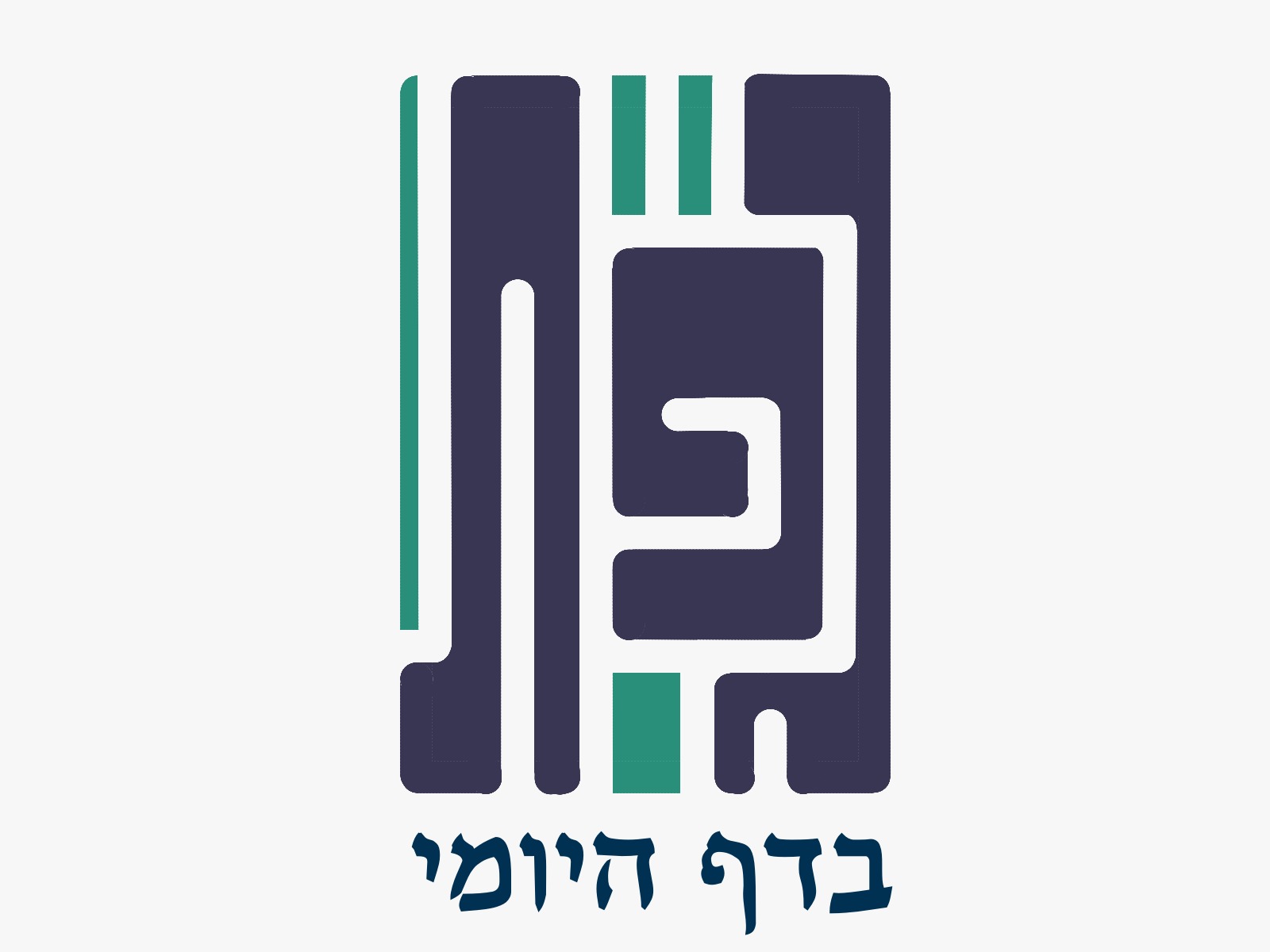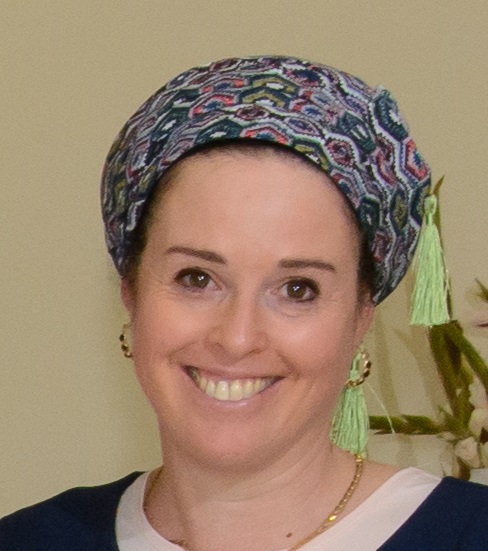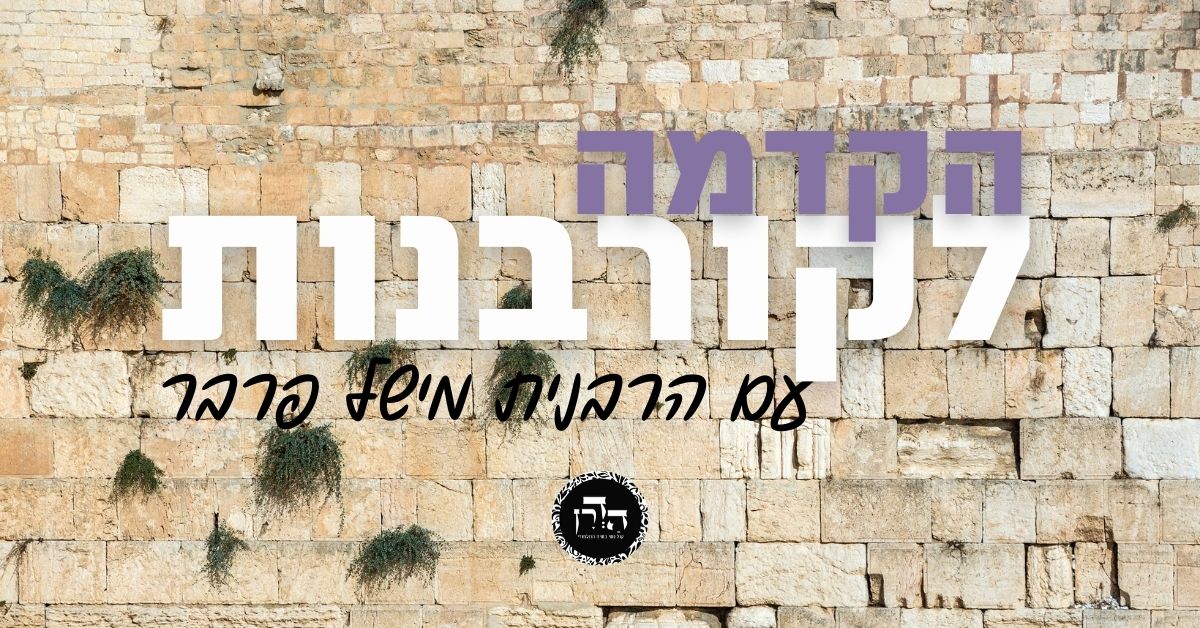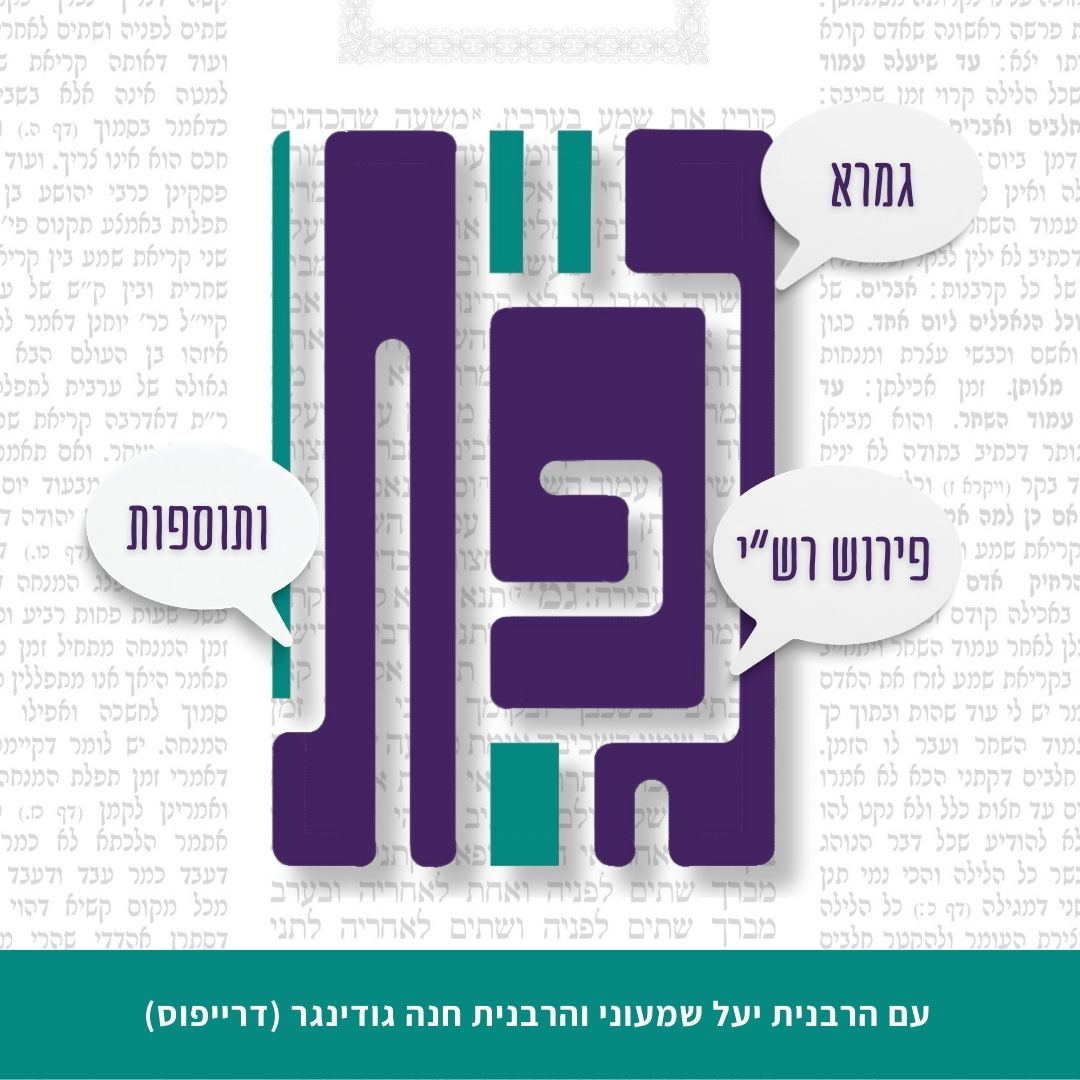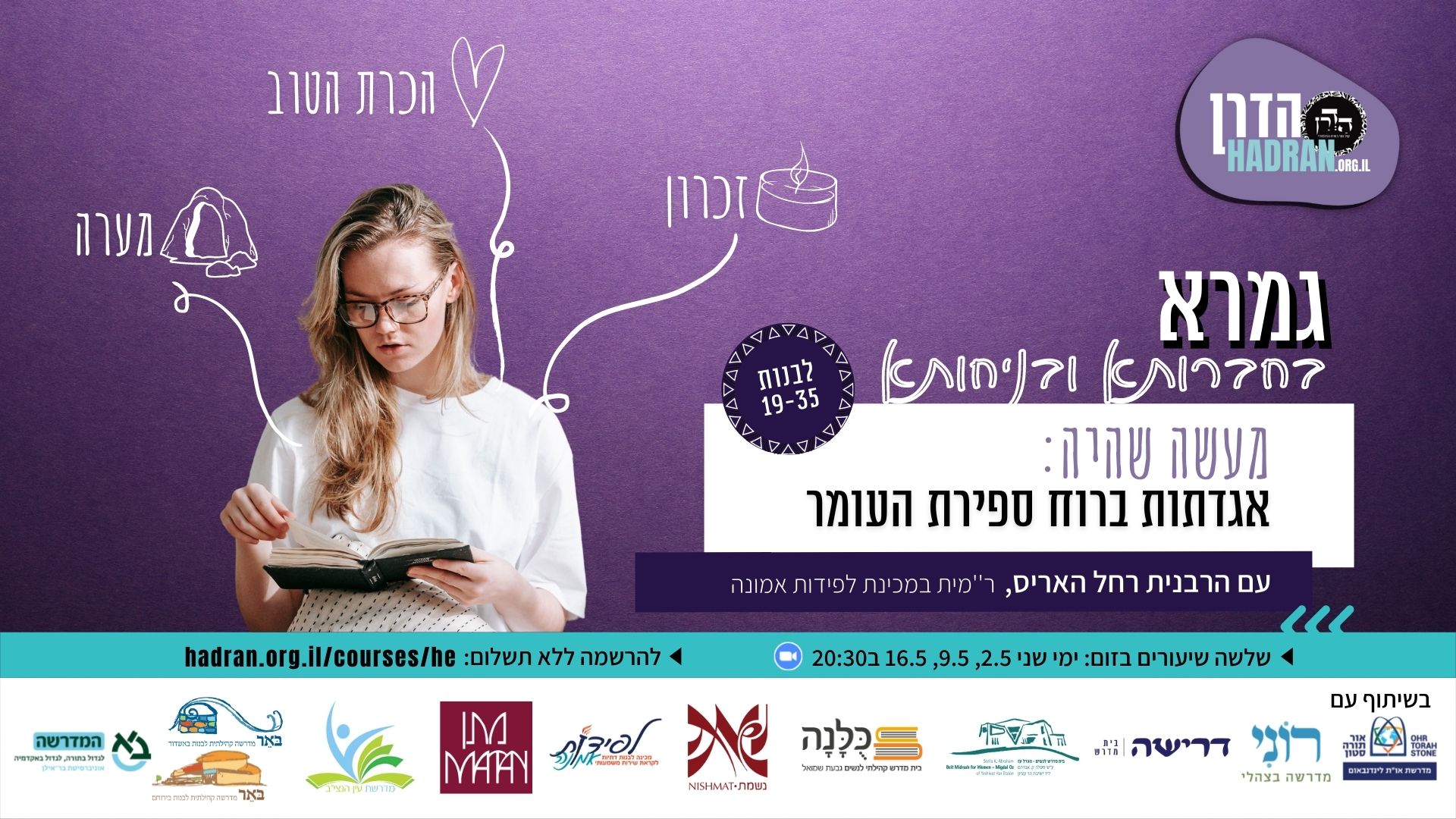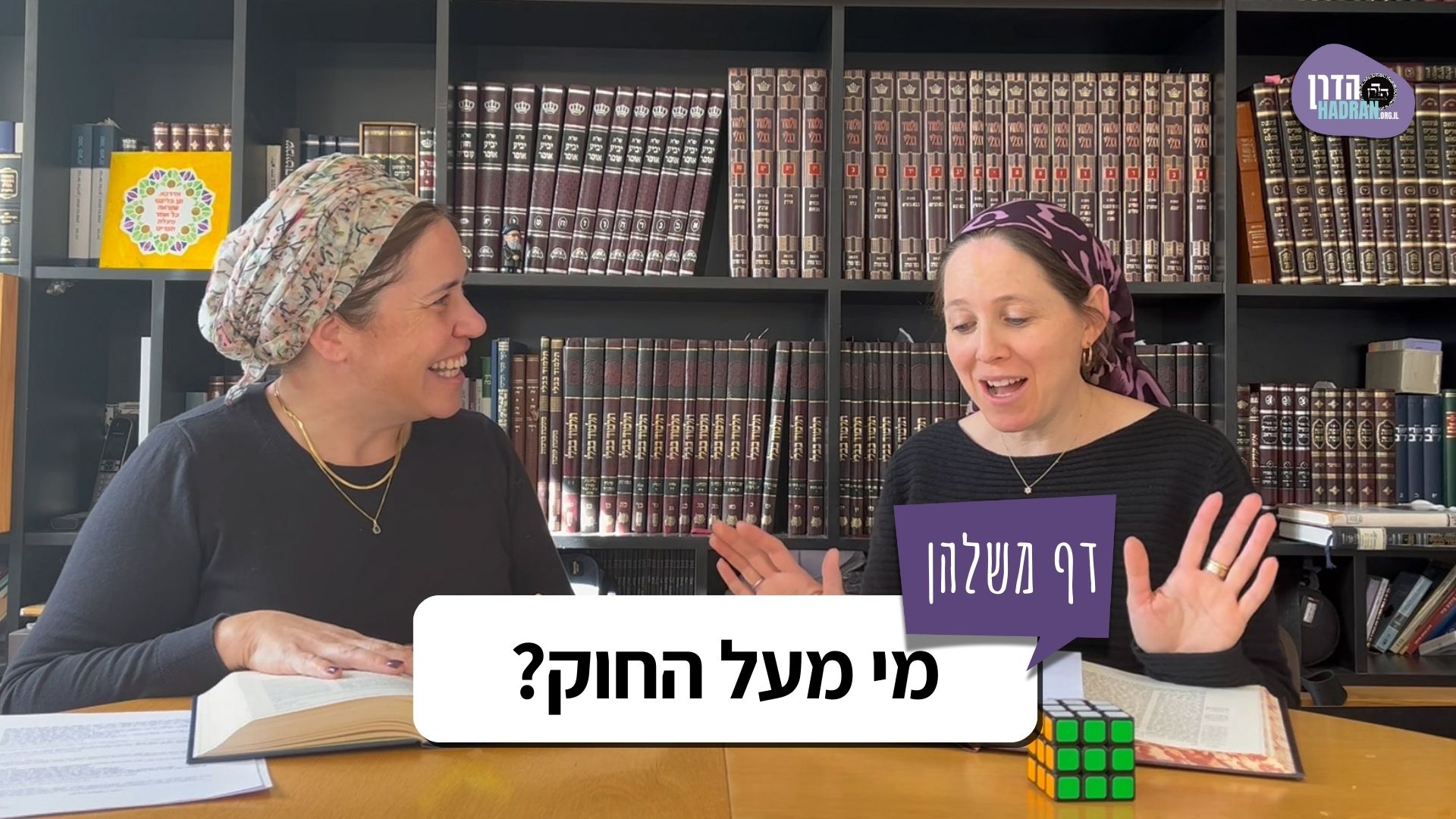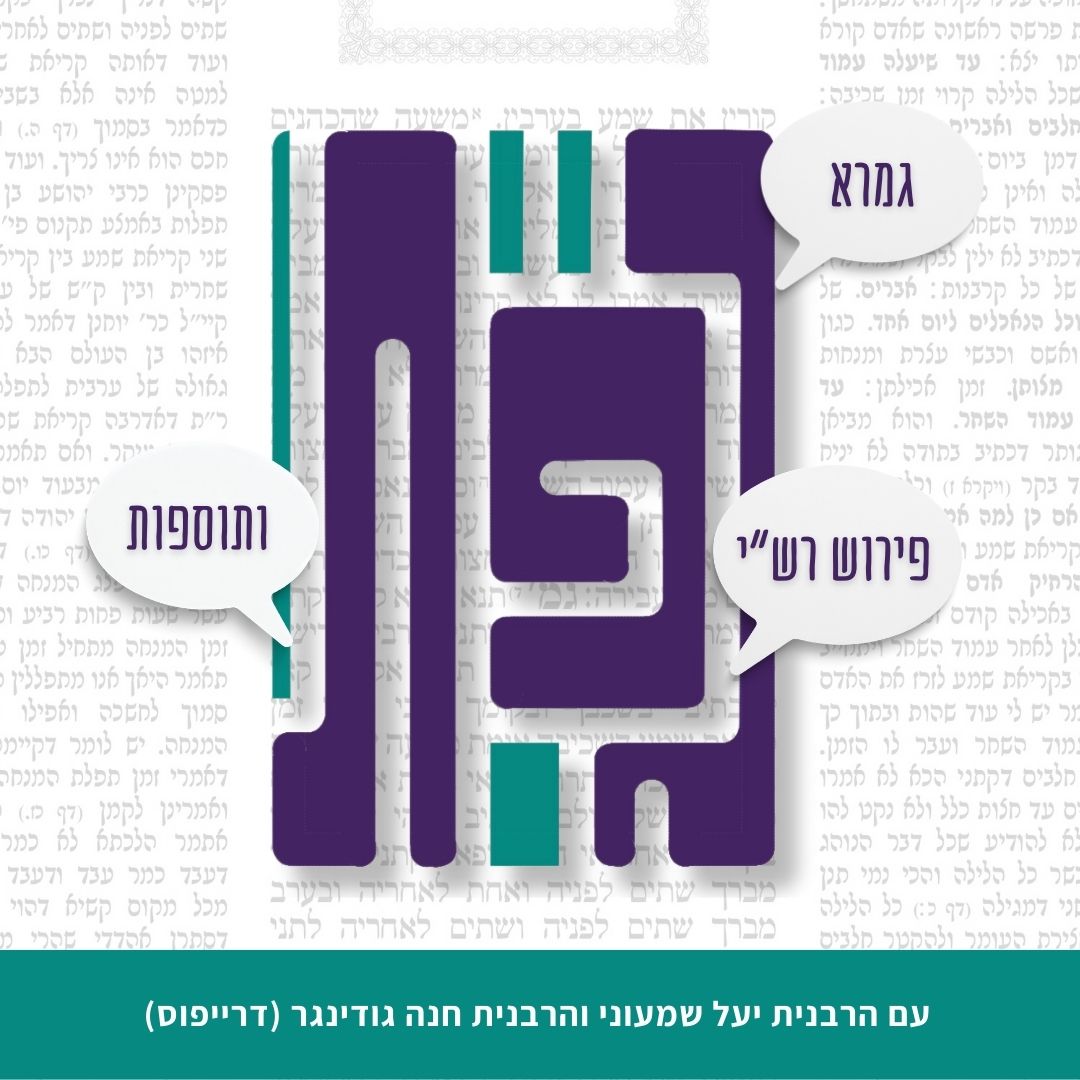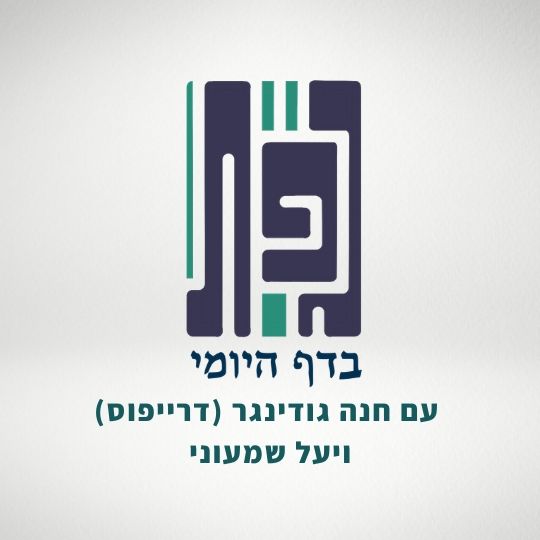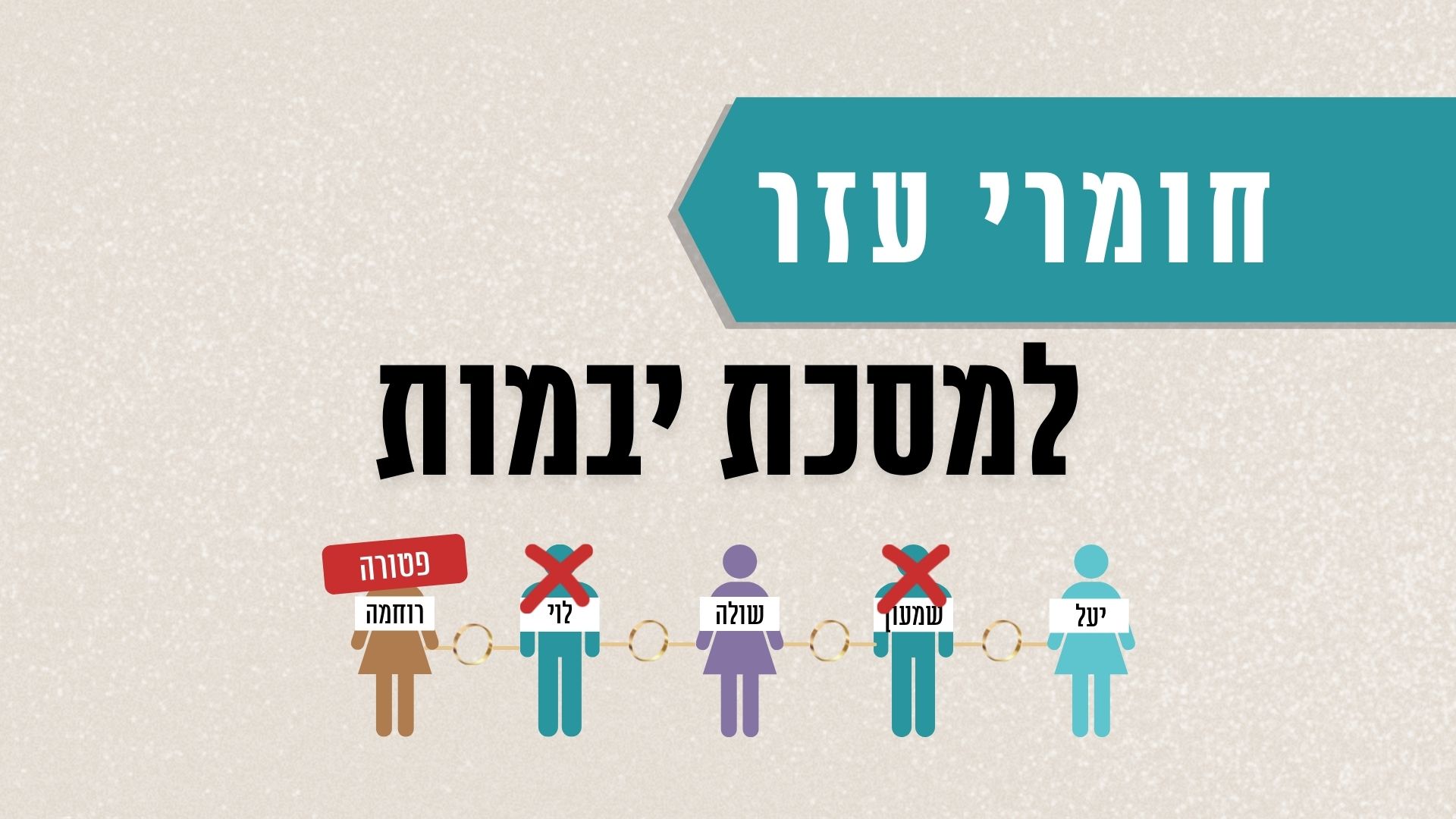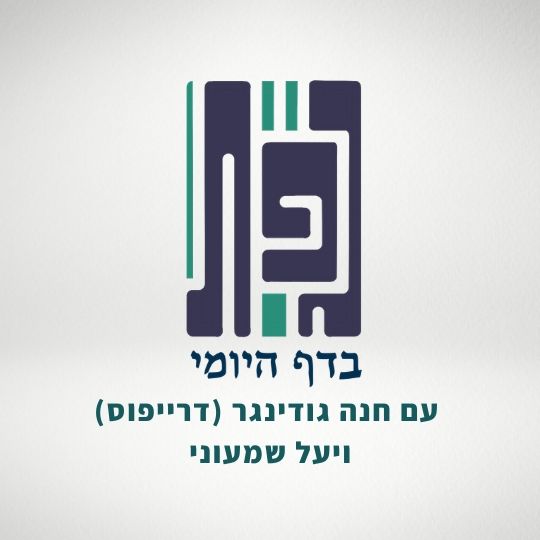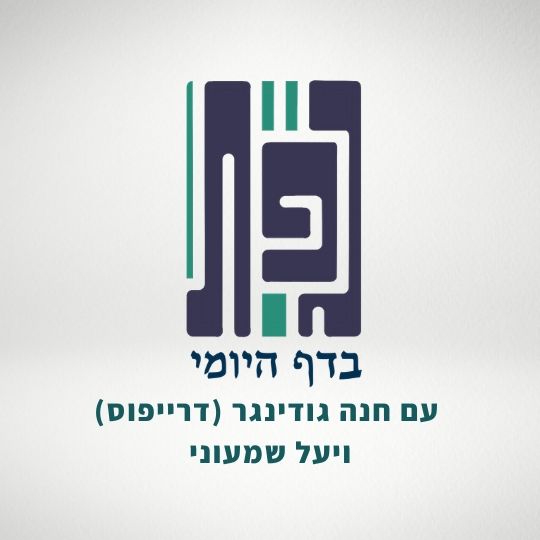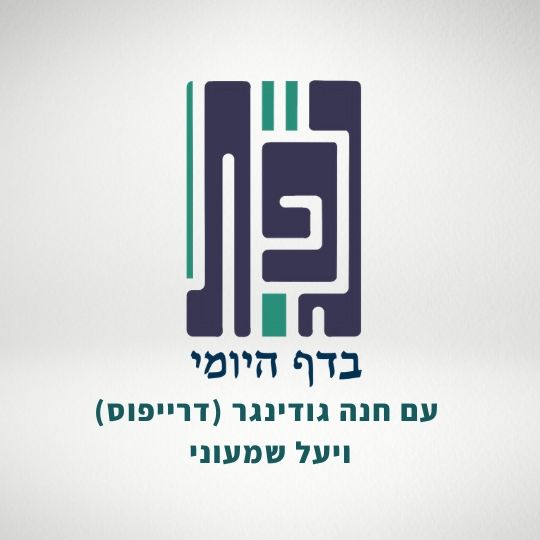מה קורה בכל השלבים של חטאת העוף (שהפריש, מולק ומזה) לגבי מליקה לחלות דין מעילה, הכשר לקבל טומאה על ידי טבול יום ומחוסר כיפורים וחיוב כרת לפיגול נותר וטמא? מה לגבי מיצוי הדם? למה זה לא נזכר במשנה? האם מיצוי מעכב או לא?

כלים
הלימוד החודש מוקדש לרפואת פיליס הכט, גיטל פעשא בת מאשה רחל על ידי חברותיה הרבות שאוהבות ומעריכות אותה.
כלים
העמקה
רוצה להבין מה באמת קורה מתחת לפני השטח של הסוגיה?
שיעורים, פודקאסטים והרחבות של מיטב המורות שלנו יפתחו לך עוד זוויות וכיווני חשיבה.
חדשה בלימוד הגמרא?
זה הדף הראשון שלך? איזו התרגשות עצומה! יש לנו בדיוק את התכנים והכלים שיעזרו לך לעשות את הצעדים הראשונים ללמידה בקצב וברמה שלך, כך תוכלי להרגיש בנוח גם בתוך הסוגיות המורכבות ומאתגרות.
פסיפס הלומדות שלנו
גלי את קהילת הלומדות שלנו, מגוון נשים, רקעים וסיפורים. כולן חלק מתנועה ומסע מרגש ועוצמתי.
מעילה ח
אֲבָל לַאֲכִילָה הוּא דְּלֹא מְרַצָּה.
But as for permitting it for eating, in this regard even Rabbi Akiva concedes that the sprinkling of the blood does not effect acceptance.
הַדְרָן עֲלָךְ קׇדְשֵׁי קָדָשִׁים
חַטַּאת הָעוֹף מוֹעֲלִין בָּהּ מִשֶּׁהוּקְדְּשָׁה, נִמְלְקָה – הוּכְשְׁרָה לְהִפָּסֵל בִּטְבוּל יוֹם וּבִמְחוּסַּר כִּפּוּרִים וּבְלִינָה.
MISHNA: One who derives benefit from a bird sin offering is liable for misuse of consecrated property from the moment that it was consecrated. Once the nape of its neck was pinched, it was rendered susceptible to disqualification for sacrifice through contact with one who was ritually impure who immersed in a ritual bath that day and is waiting for nightfall for the purification process to be completed, and through contact with one who has not yet brought an atonement offering to complete his purification process, e.g., a zav and a leper, who are not yet permitted to partake of sacrificial meat; and through its blood being left overnight, i.e., if its blood was not sprinkled before sunset.
הוּזָּה דָּמָהּ – חַיָּיבִין עָלָיו מִשּׁוּם פִּיגּוּל, נוֹתָר, וְטָמֵא, וְאֵין בָּהּ מְעִילָה.
Once its blood was sprinkled, one is liable to receive karet for eating it due to violation of the prohibition of piggul, and the prohibition of notar, and the prohibition of partaking of sacrificial meat while ritually impure. But there is no liability for misuse of consecrated property, because after the blood is sprinkled it is permitted for priests to partake of its meat and it is no longer consecrated exclusively to God.
גְּמָ׳ קָתָנֵי הוּכְשְׁרָה לִיפָּסֵל בִּטְבוּל יוֹם, וּבִמְחוּסַּר כִּפּוּרִים, וּבְלִינָה. לִיפָּסֵל – אִין, אֲבָל לְטַמּוֹיֵי – לָא.
GEMARA: The mishna teaches: From the time the nape of its neck was pinched, the bird sin offering was rendered susceptible to disqualification for sacrifice through contact with one who immersed that day, and through contact with one who has not yet brought an atonement offering, and through its blood being left overnight. It can be inferred from here that yes, it is susceptible to disqualification, but it is not fit to render other items ritually impure.
מַתְנִיתִין מַנִּי? רַבָּנַן הִיא, דְּתַנְיָא: אַבָּא שָׁאוּל אוֹמֵר: טְבוּל יוֹם
In light of the above inference, the Gemara asks: Whose opinion is expressed in the mishna? The Gemara answers: It is the opinion of the Rabbis, as it is taught in a baraita (Tosefta, Teharot 1:4) that Abba Shaul says: With regard to one who immersed that day,
תְּחִלָּה לַקֹּדֶשׁ.
until sunset he is treated as one who is impure with first-degree impurity with regard to sacrificial food. In other words, an item of sacrificial food that he touches assumes the status of second-degree impurity. A second item that comes into contact with the first item of food assumes third-degree impurity. If a third item comes into contact with the second item, it assumes fourth-degree impurity, i.e., it may not be eaten but does not impart impurity to other items.
רַבִּי מֵאִיר אוֹמֵר: מְטַמֵּא אֶת הַקֹּדֶשׁ, וּפוֹסֵל אֶת הַתְּרוּמָה. וַחֲכָמִים אוֹמְרִים: כְּשֵׁם שֶׁהוּא פּוֹסֵל מַשְׁקֵה תְרוּמָה וְאוֹכְלֵי תְרוּמָה, כָּךְ הוּא פּוֹסֵל מַשְׁקֵה קֹדֶשׁ וְאוֹכְלֵי קֹדֶשׁ.
Rabbi Meir says: One who immersed that day is considered impure with second-degree impurity, even with regard to sacrificial food, and therefore he renders sacrificial food impure and disqualifies teruma. And the Rabbis say: Just as he merely disqualifies teruma liquids and teruma foods, without them becoming impure to a degree that their impurity is transferred to another item, so too, he only disqualifies sacrificial liquids and sacrificial foods. Apparently, the mishna here is in accordance with the opinion of the Rabbis, not the opinions of Abba Shaul and Rabbi Meir.
אָמַר רָבָא: לְאַבָּא שָׁאוּל מַעֲלָה עָשׂוּ בַּקֳּדָשִׁים, שַׁוִּינְהוּ רַבָּנַן לִטְבוּל יוֹם כָּרִאשׁוֹן,
Rava rejects this analysis and says: The mishna can be explained even in accordance with the opinions of Abba Shaul and Rabbi Meir, as they might agree that by Torah law one who immersed that day only disqualifies the food and does not render it impure. But according to Abba Shaul, the Sages established a higher standard with regard to consecrated items, and therefore the Sages equated one who immersed that day to one who is impure with first-degree ritual impurity.
לְרַבִּי מֵאִיר כְּאוֹכֶל שֵׁנִי. לְרַבָּנַן, כֵּיוָן דִּטְבַל – קְלַשׁ טוּמְאָה, פָּסוּל – מְשַׁוֵּי, טָמֵא – לָא מְשַׁוֵּי.
Rava continues: According to Rabbi Meir, the Sages equated the impurity of one who immersed that day to food of second-degree ritual impurity, but according to the opinion of the Rabbis there is no additional impurity by rabbinic law. Their reasoning is that since he has immersed, although he is not completely pure, his level of ritual impurity is relatively weak. Therefore, he renders a sin offering disqualified, but he does not render it ritually impure.
הוּזָּה דָּמָהּ – חַיָּיבִין כּוּ׳. מְעִילָה הוּא דְּלֵיכָּא, אֲבָל אִיסּוּרָא – אִיכָּא. וְאַמַּאי? הָא מָמוֹנָא דְכֹהֲנִים הוּא!
§ The mishna teaches with regard to a sin offering: Once its blood was sprinkled, one is liable to receive karet for its consumption due to violation of the prohibition of piggul, and the prohibition of notar, and the prohibition of partaking of sacrificial meat while ritually impure, but there is no liability for misuse of consecrated property. The Gemara infers: There is no liability for misuse of consecrated property, but there is a prohibition against deriving benefit from it even after the blood has been sprinkled. But why is there such a prohibition? Isn’t the meat of the sin offering the property of the priests after the blood has been sprinkled? Accordingly, they would therefore be permitted to consume this meat.
אָמַר רַבִּי חֲנִינָא: לַיּוֹצְאִין, וְרַבִּי עֲקִיבָא הִיא, דְּאָמַר זְרִיקָה מוֹעֶלֶת לַיּוֹצֵא, דְּלָאו בַּת אֲכִילָה הִיא.
Rabbi Ḥanina says in explanation: The mishna is referring to meat that has been taken out from the place where it is permitted to be eaten. And this ruling is in accordance with the opinion of Rabbi Akiva, who said: Sprinkling of the blood renders fit those portions that were taken out of the place where they may be eaten, i.e., the prohibition of misuse no longer applies to them, but they are not fit for consumption.
אָמַר רַב הוּנָא אָמַר רַב: מִיצּוּי חַטַּאת הָעוֹף – אֵינוֹ מְעַכֵּב. דְּתָנֵי רַב: ״הוּזָּה דָּמָהּ״.
The Gemara continues to discuss the halakha of a bird sin offering. After the nape of its neck has been pinched and the blood sprinkled, the neck of the bird is pressed onto the side of the altar so that the blood is squeezed out and trickles down to the base of the altar. Rav Huna says that Rav says: Failure to squeeze out the blood from a bird sin offering after sprinkling the blood does not invalidate the offering or prevent atonement, as Rav teaches in his version of the mishna: Once its blood was sprinkled.
רַב אַדָּא בַּר אַהֲבָה אָמַר רַב: מִיצּוּי חַטַּאת הָעוֹף מְעַכֵּב. וְתָנֵי רַב: ״מִיצָּה דָּמָהּ״.
By contrast, Rav Adda bar Ahava says that Rav says: Failure to squeeze out the blood from a bird sin offering after sprinkling the blood does invalidate the offering and prevents atonement. And Rav teaches in his version of the mishna: Once its blood was squeezed out. Only after the blood has been squeezed out is the atonement complete and the bird may be eaten.
תָּא שְׁמַע: ״וְהַנִּשְׁאָר בַּדָּם יִמָּצֵה אֶל יְסוֹד הַמִּזְבֵּחַ חַטָּאת הִיא״. בִּשְׁלָמָא לְרַב אַדָּא בַּר אַהֲבָה, הַיְינוּ דִּכְתִיב: ״וְהַנִּשְׁאָר בַּדָּם יִמָּצֵה… חַטָּאת הִיא״, אֶלָּא לְרַב הוּנָא, מַאי ״וְהַנִּשְׁאָר״?
The Gemara raises a difficulty with regard to the statement of Rav Huna. Come and hear a verse in the Torah: “And he shall sprinkle of the blood of the sin offering upon the side of the altar; and the remainder of the blood shall be squeezed out at the base of the altar, it is a sin offering” (Leviticus 5:9). Granted, according to the opinion of Rav Adda bar Ahava, who holds that the squeezing out of the blood is essential, this is as it is written: “And the remainder of the blood shall be squeezed out at the base of the altar, it is a sin offering.” This clause indicates that only after the blood has been squeezed out is it considered a valid sin offering. But according to the opinion of Rav Huna, what does the verse mean when it states: “The remainder of the blood shall be squeezed out at the base of the altar, it is a sin offering”?
כִּדְתַנְיָא דְּבֵי רַבִּי יִשְׁמָעֵאל: שֶׁאִם נִשְׁאַר. וּמַאי ״חַטָּאת הִיא״? אַרֵישָׁא.
The Gemara answers that Rav Huna explains this verse as it is taught in a baraita of the school of Rabbi Yishmael: The verse teaches that if any of the blood remains inside the bird it must be squeezed out, but there is no requirement to ensure that blood must remain so that it can be squeezed out. Consequently, even if one does not squeeze out any blood on the side of the altar, the offering is valid. And what is the meaning of the phrase: “It is a sin offering”? This is referring to the first clause of the verse, i.e., it is a valid sin offering only if the blood is sprinkled on the side of the altar.
אֲמַר לֵיהּ רַב אַחָא בְּרֵיהּ דְּרָבָא לְרַב אָשֵׁי: אֶלָּא מֵעַתָּה, גַּבֵּי מִנְחָה דִּכְתִיב: ״וְהַנּוֹתֶרֶת״. הָכִי נָמֵי שֶׁאִם נִיתּוֹתַר? וְכִי תֵּימָא: הָכִי נָמֵי,
Rav Aḥa, son of Rava, said to Rav Ashi: If that is so, consider the fact that it is written with regard to a meal offering: “But that which is left of the meal offering shall be Aaron’s and his sons’; it is a thing most holy of the offerings of the Lord made by fire” (Leviticus 2:3). Does this also mean that if some of the meal offering remains then it is given to the priests, but there is no need to ensure that some of it remains ab initio? And if you would say this is indeed the case,
